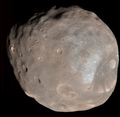Multimediaexpo.cz je již 18 let na českém internetu !!
Soubor:221831main PIA10368.png
Z Multimediaexpo.cz
(GIGAFoto82) |
(+ Doplnění) |
||
| (Nejsou zobrazeny 2 mezilehlé verze.) | |||
| Řádka 1: | Řádka 1: | ||
| - | + | GIGANTICKÁ Fotografie + Description: Colour image of Phobos, imaged by the Mars Reconnaisance Orbiter in 2008 | |
| + | |||
| + | (The High Resolution Imaging Science Experiment (HiRISE) camera on NASA's Mars Reconnaissance Orbiter took two images of the larger of Mars' two moons, Phobos, within 10 minutes of each other on March 23, 2008. This is the first, taken from a distance of about 6,800 kilometers (about 4,200 miles). It is presented in color by combining data from the camera's blue-green, red, and near-infrared channels. | ||
| + | |||
| + | The illuminated part of Phobos seen in the images is about 21 kilometers (13 miles) across. The most prominent feature in the images is the large crater Stickney in the lower right. With a diameter of 9 kilometers (5.6 miles), it is the largest feature on Phobos. | ||
| + | |||
| + | The color data accentuate details not apparent in black-and-white images. For example, materials near the rim of Stickney appear bluer than the rest of Phobos. Based on analogy with materials on our own moon, this could mean this surface is fresher, and therefore younger, than other parts of Phobos. | ||
| + | |||
| + | A series of troughs and crater chains is obvious on other parts of the moon. Although many appear radial to Stickney in this image, recent studies from the European Space Agency's Mars Express orbiter indicate that they are not related to Stickney. Instead, they may have formed when material ejected from impacts on Mars later collided with Phobos. The lineated textures on the walls of Stickney and other large craters are landslides formed from materials falling into the crater interiors in the weak Phobos gravity (less than one one-thousandth of the gravity on Earth). | ||
| + | |||
| + | In the full-resolution version of this image, a pixel encompasses 6.8 meters (22 feet), providing a resolution (smallest visible feature) of about 20 meters (about 65 feet). The image is in the HiRISE catalog as PSP_007769_9010.) | ||
| + | * Author: '''NASA/JPL-Caltech/University of Arizona''' | ||
| + | |||
| + | {{PD-USGov-NASA}} | ||
| + | [[Kategorie:Gigantické fotografie]] | ||
Aktuální verze z 15. 4. 2018, 10:42
GIGANTICKÁ Fotografie + Description: Colour image of Phobos, imaged by the Mars Reconnaisance Orbiter in 2008
(The High Resolution Imaging Science Experiment (HiRISE) camera on NASA's Mars Reconnaissance Orbiter took two images of the larger of Mars' two moons, Phobos, within 10 minutes of each other on March 23, 2008. This is the first, taken from a distance of about 6,800 kilometers (about 4,200 miles). It is presented in color by combining data from the camera's blue-green, red, and near-infrared channels.
The illuminated part of Phobos seen in the images is about 21 kilometers (13 miles) across. The most prominent feature in the images is the large crater Stickney in the lower right. With a diameter of 9 kilometers (5.6 miles), it is the largest feature on Phobos.
The color data accentuate details not apparent in black-and-white images. For example, materials near the rim of Stickney appear bluer than the rest of Phobos. Based on analogy with materials on our own moon, this could mean this surface is fresher, and therefore younger, than other parts of Phobos.
A series of troughs and crater chains is obvious on other parts of the moon. Although many appear radial to Stickney in this image, recent studies from the European Space Agency's Mars Express orbiter indicate that they are not related to Stickney. Instead, they may have formed when material ejected from impacts on Mars later collided with Phobos. The lineated textures on the walls of Stickney and other large craters are landslides formed from materials falling into the crater interiors in the weak Phobos gravity (less than one one-thousandth of the gravity on Earth).
In the full-resolution version of this image, a pixel encompasses 6.8 meters (22 feet), providing a resolution (smallest visible feature) of about 20 meters (about 65 feet). The image is in the HiRISE catalog as PSP_007769_9010.)
- Author: NASA/JPL-Caltech/University of Arizona
NASA copyright policy states that "NASA material is not protected by copyright unless noted".
(Use of NASA logos, insignia and emblems is restricted per U.S. law 14 CFR 1221)
Historie souboru
Kliknutím na datum a čas se zobrazí tehdejší verze souboru.
| Datum a čas | Náhled | Rozměry | Uživatel | Komentář | |
|---|---|---|---|---|---|
| současná | 30. 3. 2013, 17:36 |  | 3 374×3 300 (15,26 MB) | Sysop (diskuse | příspěvky) | (GIGAFoto82) |
- Editovat tento soubor v externím programu (Více informací najdete v nápovědě pro nastavení.)
Odkazy na soubor
Na soubor odkazuje tato stránka:
